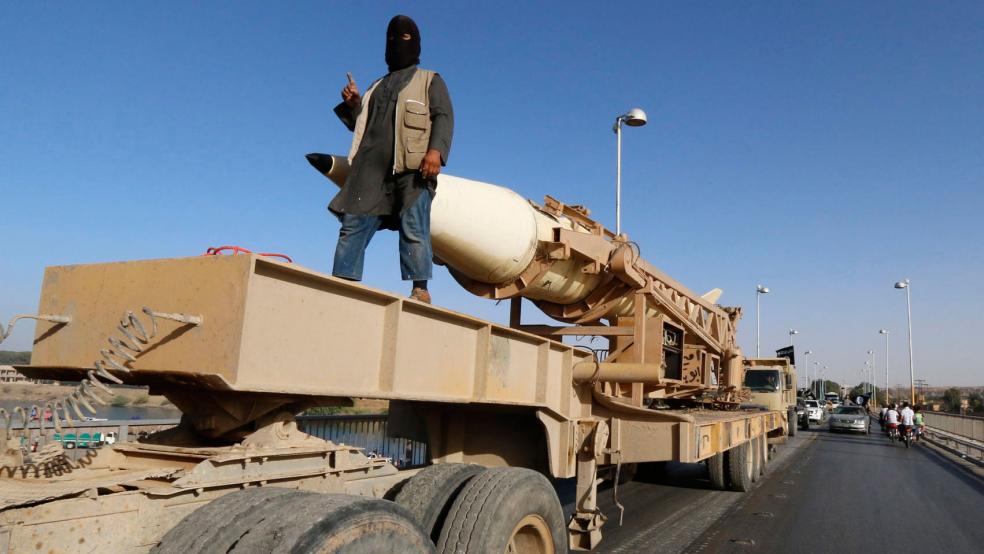Last night, President Obama authorized airstrikes against the terrorist group formerly known as the Islamic State in Iraq and the Levant, or ISIL. The catalyst, apparently, was the truly heartbreaking peril of tens of thousands of the minority Yazidi sect, trapped on a mountain by ISIL militants.
Their crime? To ascribe to a mixture of Christianity, Islam, Zoroastrianism, and Other that is tolerated by Islamic militants about as well as can be expected. Protecting them is the right thing to do. But almost before it begins, this intervention seems twisted in knots by its caveats, which spring up like truffles around this Administration.
Related: U.S. Airstrikes Begin Against Islamic State in Iraq
Caveats are essentially conditions, designating the use of force for this or that explicit situation, and the President clearly likes them. The troop surge in Afghanistan was heavily caveated, as was the Libya intervention, the Ukraine, ah, flirtation, and whatever it is that Syria was. They’re usually sops to domestic politics, a way to quiet criticism from a war-weary public.
Unfortunately, virtually all were harmful to the job at hand.
- The announced withdrawal date for the Afghan surge encouraged the Taliban to wait it out and the Afghan civilians to hedge.
- The Libyan reticence led Britain and France to head up the military option and nobody to help with the cleanup.
- And the Syrian carnival gave the United States an interest in keeping Bashar Assad in power, a position from which he has continued to murder people. Syria’s death toll is actually higher than Bosnia’s now.
Caveats can kill.
Which brings us, once again, to Iraq. The Administration’s announced intervention in Iraq seems laden with the artistic collage of caveats that fed the ongoing disasters in Libya and Syria. Firstly, according to the President, the United States will airlift food and water to the Yazidis trapped on their mountain. It will also help Iraqi forces try to break the siege.
Related: Militants Say Seeking Prisoner Swap with Lebanon
President Obama also authorized airstrikes in support of American military and civilian personnel throughout the country, should they be threatened by ISIL. This is actually really important because it wasn’t very clear if the several hundred Green Berets and supporting troops Obama sent to Iraq in June actually had access to air support. Though, very technically, they were in a non-combat mission, Iraq has this quirky habit of just sort of becoming a combat mission when you least expect it.
Lastly, and most important, the United States will also consider airstrikes “against ISIL terrorist convoys should they move towards the city [Irbil].” At the risk of stating the obvious, doesn’t this just scream to the militants “DON’T TRAVEL IN CONVOYS?” It certainly shouldn’t take extra resources in ISIL’s intelligence analysis budget to put that recommendation together. And here’s the problem: it also tells ISIL that its other violence is fine as long as it doesn’t target minority religious sects.
These caveats are more of the same distortionary rationale that told Assad it was fine to continue the genocide, even escalate it, as long as he did not use his declared stockpile of chemical weapons. He promptly switched to barrel bombs, barrels filled with rubble that acts like shrapnel, and (by some accounts) other types of chemical weapons. People keep dying, but in a better way.
Related: How the U.S. Allowed ISIS to Form a Terrorist Army
Now, there’s absolutely no problem with caveating the use of military force. In this era of limited war and humanitarian interventions, it’s often necessary. When the US takes military action without a vital interest at stake, it’s good to let the American people know that such action will fall short of D-Day. Wading into such detail about when, where and how the US will intervene simply enables ISIL to continue its advance, but with slight modifications to avoid American retribution.
It’s also not clear what the medium-term plan is. If as the president says, there is only a political solution to the ISIL problem – and, in the long term, that’s probably true – how do we get there without getting a military solution first? It’s extremely unlikely that if the Iraqi parliament agrees on a newly equitable power-sharing arrangement, ISIL will just vanish. Somebody, probably, is going to have to get rid of them, not just bombard the Yazidis with Meals-Ready-to-Eat.
To be fair, Obama is operating with one eye on public opinion. The majority of Americans oppose an intervention in Iraq, and any politician worth his salt has to know it. People are tired of war. I would imagine they’re particularly tired of wars in Iraq: this would be our third in twenty-five years, if anyone still keeps track.
Obama has clearly made the calculation that even the word “Iraq” is poison to Americans, and he’s probably not wrong. Still, if ISIL is a threat – and the White House appears to believe it is – it’s worth the hit in domestic polling numbers to give up a few caveats and try to push them back. At least don’t tell the bad guys the exact sequence of events under which you’ll hit them. Just…just this once.
Top Reads from The Fiscal Times:






